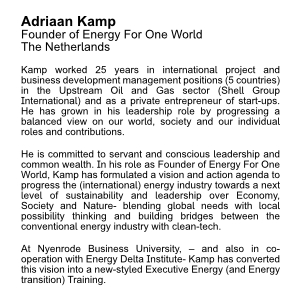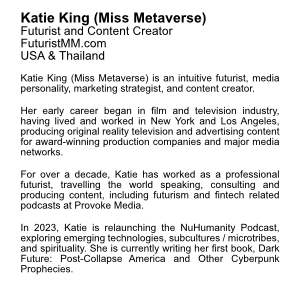
Marketplace Energy
The Future Now Show
Books
Articles
Videos
Links
Voting
Members Dialogues
Live Events
Marketplaces
supported by ChatGPT
Please send your comments, ideas, contributions related to the Marketplace Energy to
email ???
Global HUB Expert
Energy can be categorized into several types, broadly classified as "kinetic" and "potential" energy, or further detailed by their specific forms. Below are the primary types of energy:
Kinetic Energy
Energy of motion
Examples
- Mechanical energy: A moving car, flowing water.
- Thermal energy: Movement of particles in a substance (heat).
- Electrical energy: Movement of electrons in a conductor.
- Sound energy: Vibration of particles in a medium (e.g., air, water).
Potential Energy
Stored energy based on position or configuration.
Examples
- Gravitational energy: Energy due to height (e.g., a book on a shelf).
- Elastic energy: Energy stored in stretched or compressed objects (e.g., a spring).
- Chemical energy: Energy stored in chemical bonds (e.g., food, batteries).
- Nuclear energy: Energy in atomic nuclei (e.g., nuclear power).
Radiant Energy
Energy carried by electromagnetic waves.
Examples
- Light energy: Visible light, X-rays, ultraviolet, infrared.
- Microwave energy: Used in communication and cooking.
Thermal Energy
Related to the internal energy of a system due to particle motion.
Heat is the transfer of thermal energy.
Electrical Energy
Energy due to the movement of electric charges.
Examples
Powering devices, lightning.
Chemical Energy
Stored in chemical bonds of molecules.
Examples
Batteries, fossil fuels, food.
Nuclear Energy
Energy released during nuclear fission or fusion.
Examples
Nuclear reactors, the Sun's energy.
Mechanical Energy
Sum of kinetic and potential energy in a system.
Examples
Wind turbines, moving gears.
Magnetic Energy
Associated with magnetic fields.
Examples
Magnetic forces, MRI machines.
Renewable Energy Types
Derived from natural, replenishable sources:
- Solar energy: From sunlight.
- Wind energy: From moving air.
- Hydropower: From flowing water.
- Geothermal energy: From Earth's heat.
- Biomass energy: From organic matter.
the future of Energy
The future of energy is shaped by a combination of technological innovation, environmental challenges, and global demand for sustainable and efficient solutions. Here are the key trends and developments shaping this future:1. Renewable Energy Dominance
Solar and Wind Power
Continued improvements in efficiency, cost reductions, and widespread adoption are expected to make solar and wind the backbone of global energy production.
Offshore Wind Farms
The potential of offshore wind farms is growing, with advancements in floating turbines enabling energy generation in deeper waters.
Distributed Energy Systems
Rooftop solar panels and microgrids are empowering localized energy production and reducing dependency on centralized grids.2. Energy Storage
Battery Technology
Advances in lithium-ion batteries and emerging technologies like solid-state batteries and flow batteries will improve energy storage capacity, enabling reliable use of intermittent renewable sources.
Grid-Scale Storage
Large-scale storage systems will stabilize grids, ensuring consistent power supply during renewable energy downtimes.3. Green Hydrogen
Fuel Production
Green hydrogen, produced using renewable energy, is gaining attention as a clean fuel for transportation, industry, and energy storage.
Infrastructure Development
Investments in hydrogen infrastructure will accelerate its adoption across sectors.4. Decarbonization of Heavy Industries
Electrification
Industries like steel and cement are transitioning to electrified processes powered by renewable energy.
Carbon Capture and Storage (CCS)
CCS technologies are being integrated into industrial facilities to reduce emissions.5. Advanced Nuclear Energy
Small Modular Reactors (SMRs)
These are safer, more flexible, and less costly than traditional nuclear reactors.
Fusion Energy
Although still in development, breakthroughs in fusion technology could provide a virtually limitless energy source in the long term.6. Digitalization of Energy Systems
Smart Grids
AI and IoT are optimizing energy distribution, predicting demand, and integrating renewable sources efficiently.
Energy Management
Smart home systems and AI-driven tools are enabling consumers to monitor and reduce their energy consumption.7. Electrification of Transportation
Electric Vehicles (EVs)
Rapid advancements in EV technology and charging infrastructure are reducing reliance on fossil fuels.
E-mobility Ecosystems
Integration of EVs with smart grids will allow vehicles to act as mobile energy storage units.8. Circular Energy Economy
Recycling and Reuse
Recycling materials from solar panels, wind turbines, and batteries will reduce waste and raw material demand.
Bioenergy and Waste-to-Energy
Organic waste conversion into energy will support circular economic models.9. Energy Equity and Access
Off-Grid Solutions
Decentralized energy systems will bring power to remote and underserved areas.
Affordable Clean Energy
Policies and technologies aimed at reducing energy poverty will enhance global energy equity.10. Policy and Innovation Synergy
Incentives and Regulation
Governments and international bodies are increasing subsidies for clean energy and implementing stricter emissions regulations.
Public-Private Partnerships
Collaboration between stakeholders is accelerating research, deployment, and innovation.
Challenges Ahead
- Balancing supply-demand dynamics with intermittent renewable energy sources.
- Managing geopolitical tensions around critical materials like lithium and rare earth elements.
- Mitigating the environmental impacts of mining and disposal for energy technologies.By leveraging these trends and overcoming challenges, the energy sector can move closer to a sustainable, efficient, and equitable future.

The Future Now Show
Energy for One Planet
with Adriaan Kamp & Miss Metaverse
Adriaan Kamp, Founder of Energy For One World, on the implications of the War in the Ukraine, the Geopolitics of Emotions and Halfway The UN 2030 Agenda - on Peace, Energy, Economies, Climate Change & Actions the realization of the UN SDGs.
Where are we in our Energy Realities, what lessons have we learned over a decade of Energy Transition, UNSDGs and Climate Action, and what are the present thoughts and opportunities for making a good future: Energy-Economies Free of Concerns.
What is going well? What deserves our attention? And where can we make the better interventions - coming monday morning - to make a great future.
– AI summary by Zoom
Moderator
Credits
Adriaan Kamp
Founder of Energy For One World
The Hague, Netherlands
www.energyforoneworld.com
Moderator
Katie (Miss Metaverse™) King
Futurist and Content Creator
Thailand & Cary, North Carolina, USA
missmetaverse.io
futuristmm.comFelix B Bopp
Producer of The Future Now Show
clubofamsterdam.com
The Future Now Show
clubofamsterdam.com/the-future-now-show
top
Books
Energy: A Beginner's Guide
by Vaclav Smil
A concise overview of the science and history of energy, exploring how energy systems have evolved and their critical role in modern society.
Sustainable Energy - Without the Hot Air
by David J.C. MacKay
A practical guide that demystifies sustainable energy solutions using quantitative analysis.
Energy and Civilization: A History
by Vaclav Smil
Examines the relationship between energy and human development, detailing how energy sources have shaped societies.
The Prize: The Epic Quest for Oil, Money, and Power
by Daniel Yergin
Chronicles the history of the oil industry and its global geopolitical implications.
The New Map: Energy, Climate, and the Clash of Nations
by Daniel Yergin
A follow-up to The Prize, focusing on modern energy challenges, geopolitics, and the energy transition.
The Quest: Energy, Security, and the Remaking of the Modern World
by Daniel Yergin
Explores the complexities of global energy markets and the ongoing energy transition.
This Changes Everything: Capitalism vs. The Climate
by Naomi Klein
Argues that addressing climate change requires transforming economic systems.
Drawdown: The Most Comprehensive Plan Ever Proposed to Reverse Global Warming
edited by Paul Hawken
A compilation of climate solutions ranked by their potential impact, including many energy-related strategies.
The Grid: The Fraying Wires Between Americans and Our Energy Future
by Gretchen Bakke
A deep dive into the challenges and opportunities of the U.S. electrical grid.
Half-Earth: Our Planet's Fight for Life
by Edward O. Wilson
Discusses the role of energy conservation in protecting biodiversity.
Renewable Energy: A Primer for the Twenty-First Century
by Bruce Usher
Outlines the transition to renewable energy and its implications for the economy and climate.
How to Avoid a Climate Disaster
by Bill Gates
Explores the technological innovations needed to achieve net-zero emissions.
The Architecture of Natural Light
by Henry Plummer
top
Articles4 Hovering Cars 2024-28 | Magnetic Revolution
by Future Lab
Hydrogen Forecast to 2050
by DNV
DIY Light For Light On Main Street
by Leni Schwendinger
Cities need to embrace the darkness of the night sky - here's why
by Nick Dunn, Lancaster University
The liquid metal battery
by Pellion Technologies
LightingEurope
Energy Islands - Denmark
E2S Power
German Lithium Strategy
Hydrogen Forecast to 2050
by DNV
Swisspod
Trajectory hyperloop testing facility ...
Why Japan is Hollowing Out a Mountain
by The B1M
Europe’s Rare Earth dependence on China – Future Perspectives
by Patrick Crehan, CEO and Founder, Crehan, Kusano & Associates
Green hydrogen: Is the Global South paying for Germany's energy transition?
by DW News
ITER – Unlimited Energy
Smart Roads
TransPod
Green hydrogen is coming – and these Australian regions are well placed to build our new export industry
by Steven Percy, Senior Research Fellow, Victorian Hydrogen Hub
Green Hydrogen for Industry: A Guide to Policy Making
by IRENA - International Renewable Energy Agency
The truth about hydrogen
by DW Planet A
The liquid metal battery
Exploring the TRUE cost of ditching fossil fuels.
By Just Have a Think
World Nuclear Performance Report 2021
By World Nuclear Association
These reports provide valuable insights into the anticipated transformations within the global energy landscape, offering guidance for policymakers, industry stakeholders, and researchers engaged in energy transition strategies. The future of energy is a critical topic addressed by various leading organizations through comprehensive reports. Here are some of the most influential publications:
World Energy Outlook 2024 by the International Energy Agency (IEA):
This flagship report provides authoritative analysis and projections of global energy trends, exploring scenarios that assess future energy demand, supply, and implications for energy security and environmental sustainability.
Global Energy Perspective 2024
by McKinsey & Company
This report offers a detailed demand outlook across various sectors and fuels, presenting scenarios aligned with the Paris Agreement's 1.5°C pathway. It examines the implications of energy transitions on markets and industries.
New Energy Outlook 2024
by BloombergNEF
This publication presents long-term energy and climate scenarios, analyzing the transition to a low-carbon economy and the evolving energy mix.
Global Energy Outlook
by Resources for the Future:
This data tool allows users to explore harmonized data and projections from leading energy organizations, facilitating comparisons across various metrics such as primary energy consumption and CO2 emissions.
Future Energy Scenarios
by National Grid ESO
This publication presents strategic and credible energy futures to support Great Britain's decarbonization journey to net-zero emissions, exploring different pathways and their implications.
top
Videosthe future of CERN, Part 1 of 7
A Club of Amsterdam event - http://www.clubofamsterdam.com - with Dr. Sergio Bertolucci, Director for Research and Computing, CERN moderated by Humberto Schwab, Philosopher, Physicist.
CERN is the European Organization for Nuclear Research near Geneva, Switzerland, and famous for its particle accelerators, such as the Large Hadron Collider.the future of CERN, Part 2 of 7
the future of CERN, Part 3 of 7
the future of CERN, Part 4 of 7
the future of CERN, Part 5 of 7
the future of CERN, Part 6 of 7
the future of CERN, Part 7 of 7
Bill Spence, Part 1 of 2, the future of Shell
Bill Spence, Manager Strategic Issues, Shell Upstream International presents at the Club of Amsterdam event about "the future of Shell" - March 17, 2011
Bill Spence, Part 2 of 2, the future of Shell
Andrei Kotov, the future of Shell
Andrei Kotov, Commercial Adviser Global LNG, Shell Upstream International
Guus Berkhout, Part 1 of 2, the future of Shell
Guus Berkhout, Professor of Geosciences, Professor of Innovation
Guus Berkhout, Part 2 of 2, the future of Shell
How to end dependence from fossil energy sources
with Livio de Santoli & Angelo Consoli
Energy Efficiency
with Michael Pachlatko
Jeremy Rifkin | The Green New Deal - Beyond the book
by SpeakInc
top
Links
International Energy Agency (IEA), Paris, France
Energy policies, global energy statistics, and renewable energy research.
Notable Work: World Energy Outlook, Energy Technology Perspectives.
International Renewable Energy Agency (IRENA), Abu Dhabi, UAE
Promotion of renewable energy globally.
Notable Work: Renewable energy data, global energy transition roadmaps.
National Renewable Energy Laboratory (NREL), Golden, Colorado, USA
Renewable energy and energy efficiency research.
Notable Work: Solar, wind, and bioenergy innovation.
Lawrence Berkeley National Laboratory (LBNL) , Berkeley, California, USA
Energy efficiency, grid integration, and clean energy technologies.
Energy Institute at University College London (UCL Energy Institute), London, UK
Energy systems, decarbonization, and sustainability research.
Fraunhofer Institute for Solar Energy Systems (Fraunhofer ISE), Freiburg, Germany
Solar energy research and technology development.
Notable Work: Solar PV, energy storage, smart grids.
World Energy Council (WEC), London, UK
Energy sustainability, policy frameworks, and global energy transition.
Notable Work: World Energy Trilemma Index, Energy Issues Monitor.
MIT Energy Initiative (MITEI), Cambridge, Massachusetts, USA
Advanced energy research and innovation.
Notable Work: Future of nuclear energy, energy storage, climate change.
Energy Systems Research Unit (ESRU) at University of Strathclyde, Glasgow, UK
Energy systems modeling, sustainable energy technologies.
The Rocky Mountain Institute (RMI), Basalt, Colorado, USA
Accelerating clean energy transitions and efficiency.
-Notable Work: Zero-carbon buildings, electric vehicles, energy policy.
The European Energy Research Alliance (EERA), Brussels, Belgium
Coordinated energy research in Europe.
Notable Work: Clean energy solutions for the EU's climate goals.
Asia Pacific Energy Research Centre (APERC), Tokyo, Japan
Energy security and sustainability in the Asia-Pacific region.
King Abdullah Petroleum Studies and Research Center (KAPSARC), Riyadh, Saudi Arabia
Energy economics, policy, and sustainability.
Global CCS Institute, Melbourne, Australia
Carbon capture and storage (CCS) technologies and policies.
Notable Work: CCS database, reports on decarbonization.
International Atomic Energy Agency (IAEA), Vienna, Austria
Nuclear energy, safety, and policy.
Here are some of the leading energy companies globally, known for their scale, revenue, and influence in the energy sector:
Oil and Gas Companies
Saudi Aramco (Saudi Arabia)
The largest oil company globally by market capitalization, known for its vast reserves and production capacity.
ExxonMobil (United States)
One of the largest publicly traded oil and gas companies, involved in exploration, production, refining, and distribution.
Shell (Netherlands/UK)
A global energy giant with a strong presence in oil, gas, and increasingly in renewable energy.
BP (United Kingdom)
Focused on oil and gas while expanding investments in renewable energy and green technologies.
Chevron (United States)
Known for its integrated operations across the oil and gas value chain.Renewable Energy Companies
NextEra Energy (United States)
A leading clean energy company, known for its investments in wind and solar energy.
Ørsted (Denmark)
The world’s largest developer of offshore wind farms, with significant investments in green energy.
Iberdrola (Spain)
A major player in renewable energy, particularly wind power, and a leader in the global energy transition.
First Solar (United States)
A prominent solar energy company specializing in photovoltaic technology.
Enel (Italy)
A multinational energy company with a strong focus on renewable energy sources like solar, wind, and hydro.Energy Equipment and Services
Siemens Energy (Germany)
Provides equipment and services for power generation, including wind turbines and grid solutions.
Schneider Electric (France)
Known for energy management and automation solutions.
General Electric (GE) Energy (United States)
A major player in renewable energy technologies and power generation equipment.State-Owned Giants
Gazprom (Russia)
A leading global energy company, primarily focused on natural gas exploration, production, and distribution.
China National Petroleum Corporation (CNPC)
A state-owned enterprise dominating the oil and gas sector in China.
Petrobras (Brazil)
A major oil producer in South America, heavily involved in offshore drilling.Emerging Players in Energy Transition
Tesla (United States)
While primarily known for electric vehicles, Tesla is also a significant player in renewable energy through battery storage and solar solutions.
SunPower (United States)
Focused on solar technology and residential energy solutions.
top
Voting
top
Members Dialogues
top

Live Events
Copyright © 2002-2025, Felix Bopp. All rights reserved.













